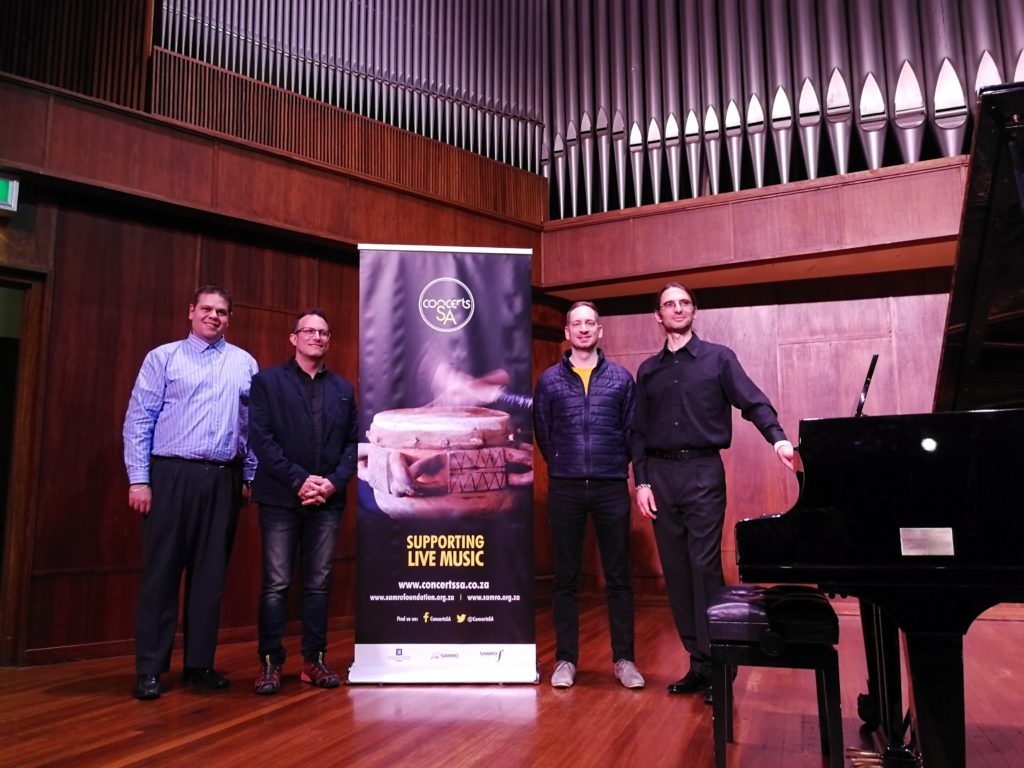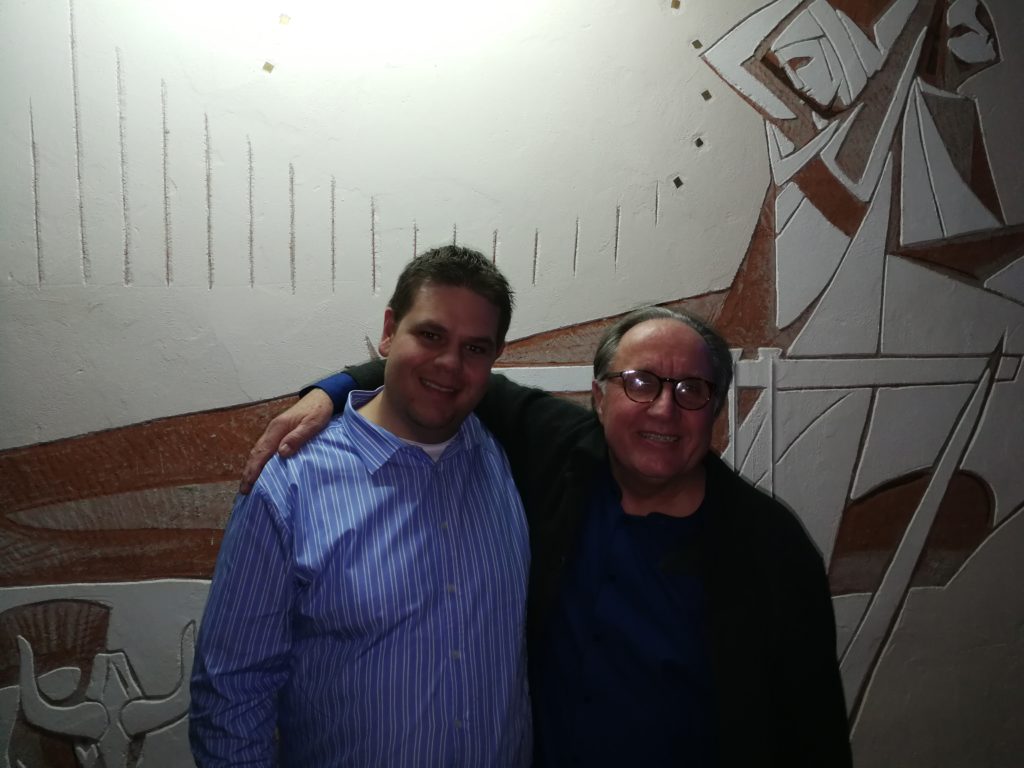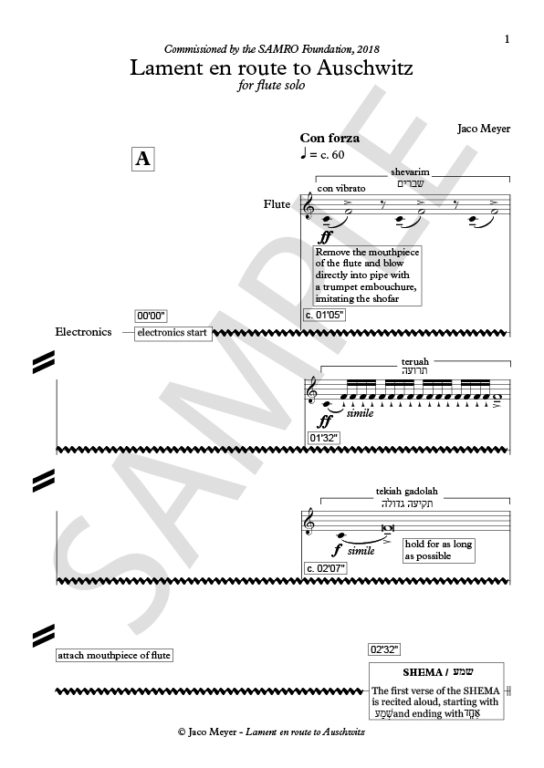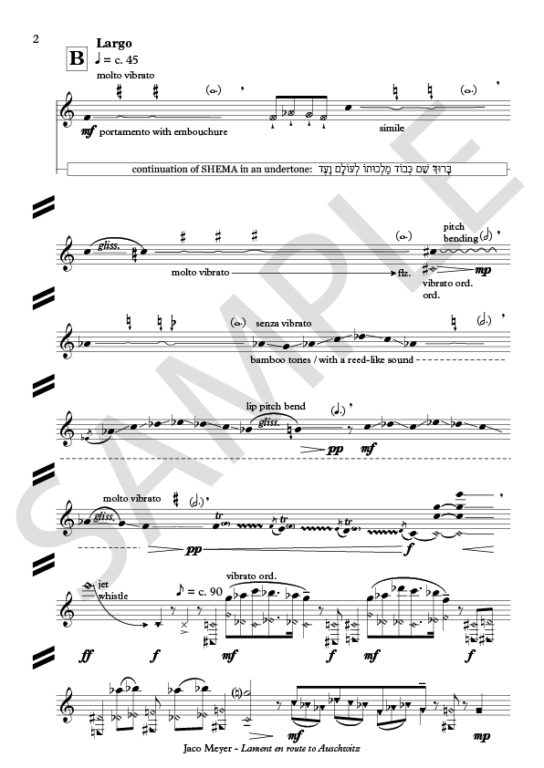
Lament en route to Auschwitz
for flute solo and electronics
Composition Details
Instrumentation | Flute and electronics |
Duration | 15’50” |
Year of composition | 2018 |
Lyrics/text | Shema, Amidah and Confession at a deathbed from the Siddur |
Distant Bombing by Filo_Rossi. This work is licensed under the Attribution 3.0 License: https://creativecommons.org/licenses/by/3.0/ The original material can be downloaded from https://freesound.org/people/Filo_Rossi/sounds/342136/ Fragments were trimmed, layered and reverb was added. | Explosion by Iwiploppenisse. This work is licensed under the Attribution 3.0 License: https://creativecommons.org/licenses/by/3.0/ The original material can be downloaded from https://freesound.org/people/Iwiploppenisse/sounds/156031/ Fragments were trimmed, layered and reverb was added. | War Noises (Distance Explosions) by gkillhour. This work is licensed under the Attribution 3.0 License: https://creativecommons.org/licenses/by/3.0/ The original material can be downloaded from https://freesound.org/people/gkillhour/sounds/267222/ Fragments were trimmed, layered and reverb was added. | psycho scream 1 by FreqMan. This work is licensed under the Attribution 3.0 License: https://creativecommons.org/licenses/by/3.0/ The original material can be downloaded from https://freesound.org/people/FreqMan/sounds/42847/ Fragments were trimmed, layered and reverb was added.
Programme Notes
Lament en route to Auschwitz for solo flute and electronics was commissioned by the SAMRO Foundation with the specific instruction that it should commemorate a major historical event. I decided to compose a work that I can dedicate to those who were forcefully deported to Auschwitz in order to be exterminated as part of the notorious genocide. I wanted to compose something that gives the listener a feel of uncomfortableness and confusion – an emotional Sturm und Drang – but in a slowly immersing manner, moving away from the sonoristic and expressionism that followed shortly after the Second World War. The many alternative techniques in the flute part, scattered in a demented way, testifies right at the beginning that this composition is far removed from the conventional music that most listeners might expect. This is also partly because I approach composition (in this work) at a very personal level, sharing my idiosyncratic explorations and expressions openly with the listener. I would therefore rather describe this composition as an aural representation of my thoughts and feelings regarding this topic and not as a composition on the topic. This composition is dedicated to all the Jewish prisoners who were taken to Auschwitz by train.
Composer’s Statement
Lament en route to Auschwitz for solo flute and electronics was commissioned by the SAMRO Foundation with the specific instruction that it should commemorate a major historical event. Although I am a gentile, my philo-semitism and interest in the World War II Jewish holocaust amalgamated upon reading the brief and I was eager to start sketching. I decided to compose a work that I can dedicate to those who were forcefully deported to Auschwitz in order to be exterminated as part of the notorious genocide. I stumbled across many compelling stories about people in transit who started to improvise melodies on the trains – soon after these melodies transformed into a uniting choir. Because they were afraid that these melodies might die with them, some of the people escaped and jumped off the train to go back and share the music with those who were still unscathed. This stimulated experimental ideas to create a quasi-programmatic work that takes place in a train car. Due to the woeful consequence of these deportations, very little information is available on what exactly happened on those trains, but there is very little doubt that the Shema, Amidah, and Confession at a deathbed were regularly recited prayers en route. The Shema (Hear, O Israel) is the most important prayer in Judaism and it is a mitzvah to recite it twice daily, traditionally the last words to say before going to sleep. This is also the prayer that most observing Jews will recite when in anguish. This is ironic in a way, because the Shema is also allusive of a witness – however, witnessing a juxtaposed perturbation. Similar to the Shema, the Amidah is a central prayer in Jewish liturgy and recited three times a day. The Confession at a deathbed is for anyone who approaches death and needs to confess – it is closely associated with the Shema. I can only imagine that the prayers were not recited in a well-rehearsed manner and therefore I recorded these prayers at different speeds and intervals: in order to create a tumultuous drone of prayers.
My extensive research and conversations with survivors contributed immensely to my empathic approach towards this composition and I simply could not compose anything that was structurally coherent or particularly ‘beautiful’. Instead, I wanted to compose something that gives the listener a feel of uncomfortableness and confusion – an emotional Sturm und Drang – but in a slowly immersing manner, moving away from the sonoristic and expressionism that followed shortly after the Second World War. The many alternative techniques in the flute part, scattered in a demented way, testifies right at the beginning that this composition is far removed from the conventional music that most listeners might expect. This is also partly because I approach composition (in this work) at a very personal level, sharing my idiosyncratic explorations and expressions openly with the listener. I would therefore rather describe this composition as an aural representation of my thoughts and feelings regarding this topic and not as a composition on the topic.
At the beginning of the work, the flautist has to imitate three different shofar blasts, associated with war: the shevarim, teruah, and tekiah gadolah. The flute needs to be disassembled as a physical gesture of dejection. In the next segment, the (now assembled) flute has sustained tones that are performed portamento, using the embouchure for quarter-tone bends to imitate the cantillation of a person when readings are chanted. The flute eventually metamorphoses into the voice of a bewildered captive who is on a deportation train to Auschwitz – the destination is known, but the destiny of the people is not. Devoted to their religion, they recite their prayers and the focus shifts to the emotional perplexity of a specific character: the flute. As the train approaches the final destination – one of the most infamous concentration camps in history – another character starts to recite the Confession at a deathbed, the Jewish prayer one should pray if you believe that someone is going to die. After this prayer, the flute is disassembled again and plays a train whistle sound to signal the arrival at the station. Nor the flute, neither the prayers, are heard again.
This composition was composed and recorded with the support of Rabbi David Shaw and participating members of a Johannesburg-based minyan. The score and tape have no kedusha and do not need to be put into shaimos. This composition may not be performed without the written consent of the composer. It is not representative of any person, religion, place or situation. It is merely a lament for those who were brutally killed during the holocaust.
The first performance of this composition took place at the 2019 South African Music Concert on 30 July 2019 at the School of Music and Conservatory of the North-West University. It was performed by György Sándor Fazakas. Fazakas dedicated his performance to Hansgeorg Schmeiser who suddenly passed away on 22 July – he would have presented master classes in South Africa in August 2019.
This composition is dedicated to all the Jewish prisoners who were taken to Auschwitz by train.
Recordings
Performances
30 July 2019. South African Music Concert. School for Music and Conservatory, North-West University, Potchefstroom. Flute: George Fazakas.
12 January 2021. In Retrospect. Johannesburg Holocaust and Genocide Centre. Johannesburg. Flute: George Fazakas.
Media


Premiere of Lament en route to Auschwitz. Compositions by Miles Warrington, Chris van Rhyn, and Hannes Taljaard were also performed at the 2019 South African Music Concert of the North-West University.
Jaco Meyer and George Fazakas at the 2019 South African Music Concert of the North-West University. Fazakas performed Lament en route to Auschwitz for flute solo and electronics at this concert.
Score
The music score of this composition can be ordered from the composer through the contact page. Please ensure that you provide the correct title and version/instrumentation of the composition that you would like to order.

